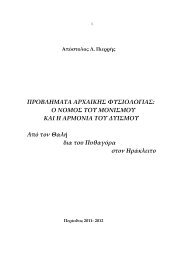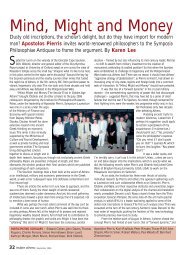chapter 10 the monism of darkness and the dualism of limit and ...
chapter 10 the monism of darkness and the dualism of limit and ...
chapter 10 the monism of darkness and the dualism of limit and ...
You also want an ePaper? Increase the reach of your titles
YUMPU automatically turns print PDFs into web optimized ePapers that Google loves.
58 CHAPTER <strong>10</strong><br />
·ûÚ·, ıÂáÓ ù¯ËÌ· ÙÈÌÈÒÙ·ÙÔÓ<br />
it is possible that a reference to <strong>the</strong> Breeze <strong>and</strong> <strong>the</strong> Air <strong>of</strong> Phoenician<br />
<strong>the</strong>ology (<strong>the</strong> Sidonian in particular according to Eudemus’ account)<br />
is involved. To <strong>the</strong> end <strong>of</strong> <strong>the</strong> fourth century B.C. belongs also <strong>the</strong><br />
relevant <strong>and</strong> characteristic fragment <strong>of</strong> Philemon, Fr. 95 PC Gr. VII p.<br />
278). The Hippocratic text ÂÚd º˘ÛáÓ grounds medicine in <strong>the</strong><br />
cosmology <strong>of</strong> Air (v. <strong>chapter</strong> III; cf. ÂÚd ^IÂÚɘ NfiÛÔ˘ I, pp. 612-4<br />
Kuehn). The interpretation <strong>of</strong> Orphic poems contained in <strong>the</strong> famous<br />
Derveni papyrus identifies Zeus with <strong>the</strong> all-subduing, omnipresent<br />
Air, <strong>and</strong> Orphic fate with <strong>the</strong> spirit (<strong>the</strong> breath) <strong>of</strong> Air <strong>and</strong> <strong>the</strong><br />
Wisdom <strong>of</strong> Zeus 17 . According to <strong>the</strong> Stoics, everything is permeated<br />
by Spirit as by a tone (tension) that unifies being, holds it toge<strong>the</strong>r <strong>and</strong><br />
sustains it in existence; Spirit is <strong>the</strong> active factor <strong>of</strong> <strong>the</strong> world, <strong>the</strong> very<br />
divinity in its activeness that binds toge<strong>the</strong>r <strong>the</strong> Whole Universe <strong>and</strong><br />
con-sists each particular thing inside <strong>the</strong> world (V. A. Pierris, Excursus<br />
III: On Spirit <strong>and</strong> Tension, to: First principles <strong>and</strong> <strong>the</strong> Beginning <strong>of</strong><br />
World-Formation in Stoicism, in K. Boudouris (ed.) Hellenistic<br />
Philosophy vol. II, pp. 170-5). More specifically, <strong>the</strong> bonds (≤ÍÂȘ)<br />
that constitute <strong>and</strong> hold fast <strong>the</strong> peculiar quality <strong>of</strong> inanimate things<br />
are winds (à¤Ú˜) (cf. SVF II 449). The significance <strong>of</strong> Wind-Spirit is<br />
also obvious in Greek mythology as testified by religious poetry.<br />
According to <strong>the</strong> rhapsodic Orphic epics, <strong>the</strong> spirit-winds toge<strong>the</strong>r<br />
with cosmogonic Eros are begotten by primaeval Time (Kern OF 37).<br />
Conversely, in <strong>the</strong> Phoenician account <strong>of</strong> Sanchouniathon we find<br />
that <strong>the</strong> Wind-<strong>of</strong>-<strong>the</strong>-Bay or <strong>the</strong> Wind-<strong>of</strong>-<strong>the</strong>-Womb, ï KÔÏapple›·˜<br />
ôÓÂÌÔ˜ (<strong>the</strong> basic wind, maybe Zephyr as would suit Phoenicia) <strong>and</strong><br />
Baan (which Philo interprets as Night, <strong>and</strong> signifies <strong>the</strong> primordial<br />
Chaos) give birth to Aeon (Cosmogonical Time) <strong>and</strong> to Primogenitus,<br />
ÚˆÙfiÁÔÓÔ˜, <strong>the</strong> First-Born (FGrH 790F2, <strong>10</strong>§7). We are in <strong>the</strong><br />
origin <strong>of</strong> things, <strong>the</strong> beginning <strong>of</strong> cosmogony. Alcaeus (Fr. 327 Voigt)<br />
makes Eros <strong>the</strong> <strong>of</strong>fspring <strong>of</strong> Zephyr <strong>and</strong> Iris. One <strong>of</strong> <strong>the</strong> versions<br />
mentioned in Antagoras’ poem (Powell, Collectanea Alex<strong>and</strong>rina,<br />
120) assumes Eros to be <strong>the</strong> son <strong>of</strong> <strong>the</strong> Winds. The importance <strong>of</strong> <strong>the</strong><br />
Winds as life-generating <strong>and</strong> fertile principles <strong>of</strong> high ontological rank<br />
was not only <strong>the</strong> product <strong>of</strong> logico-mythical symbolism but had also a<br />
religious cult <strong>and</strong> ritual basis, especially in Attica. The Tritopatores (or<br />
Trotopatreis) were worshipped as <strong>the</strong> founders <strong>of</strong> social groups










